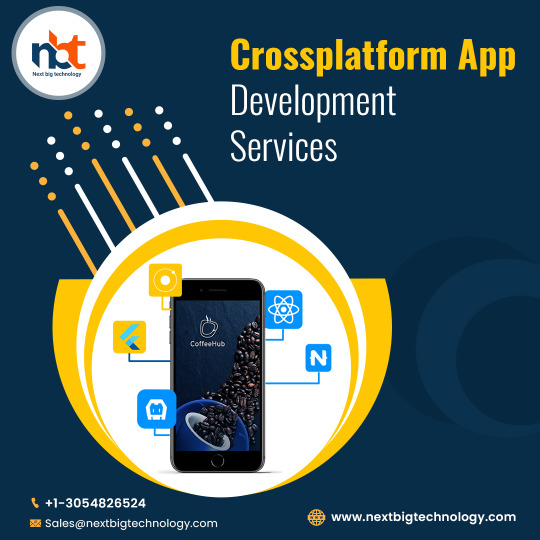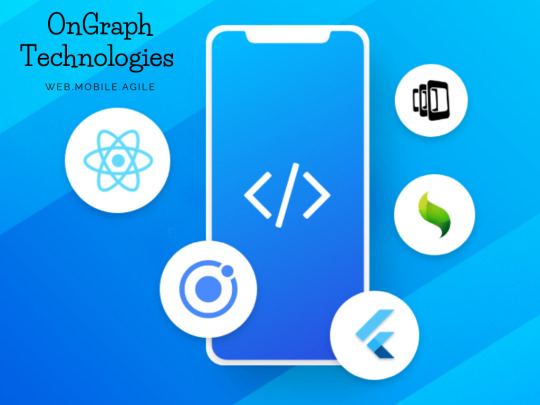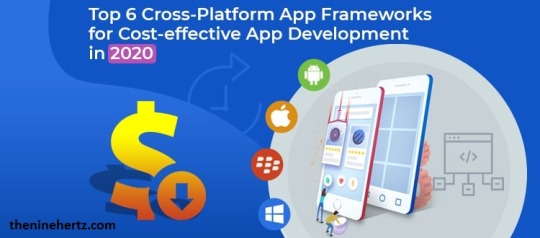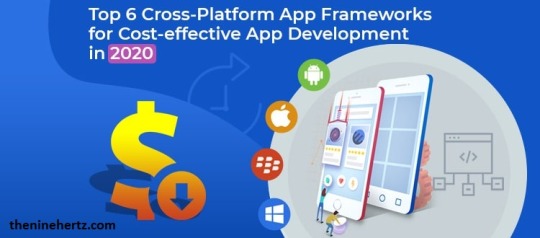#CrossPlatformFramework
Explore tagged Tumblr posts
Text







The F1 of App Development - Flutter vs. NativeScript!
Here's the breakdown of the key differences between Flutter and NativeScript - two of the top contenders in the Grand Prix of cross-platform #appdevelopment.
Swipe through to see which one will take the checkered flag.
#FlutterVsNativeScript#CrossPlatformAppDevelopment#HireFlutterDevelopers#NativeScriptDevelopment#FlutterPerformance#NativeScriptArchitecture#FlutterTesting#NativeScriptPlugins#FlutterWidgets#NativeScriptComponents#FlutterDart#NativeScript#NativeScriptApps#NativeScriptModules#CrossPlatformFramework#AppDevelopment#SoftwareDevelopment#Flutter#Comparison#Technology#MobileApps#Digitization#TechSavvy#Functionality#Performance#MobileAppDevelopment#FlutterFramework#CommunitySupport#Integration#AppPerformance
0 notes
Text
Which Cross-Platform App Development Framework Is Right for You?

Because so many people now use mobile devices, your app must function properly on a variety of phones and tablets. Cross-platform frameworks are tools that aid with this process. They let developers design apps that work on both Android and iOS. Some programs claim that you can create an app once and have it function everywhere. However, not all of these tools are the same. Some are better for specific tasks or may be easier to utilize.
This article will go over well-known tools including React Native, Xamarin, Flutter, and Ionic. We’ll go through what distinguishes each one and how to select the best one for your needs.
What framework to use for cross-platform app development?
Determining the Best cross-platform framework largely depends on the specific needs and priorities of your project.
React Native
Pros: Developed by Facebook, React Native allows developers to use React along with native platform capabilities. It has a large community, which means a lot of resources, libraries, and third-party plugins are available.
Cons: Might require native modules for some advanced features, which means you might end up writing platform-specific code.
Flutter
Pros: Developed by Google, Flutter uses the Dart language and is known for its fast performance and expressive UI. It has a widget-based approach that can replicate native components.
Cons: Being relatively newer, it might not have as many third-party libraries as older frameworks, and Dart isn’t as widely adopted as JavaScript.
Xamarin
Pros: Backed by Microsoft, Xamarin uses C# for development, allowing for shared code across platforms. It integrates well with Visual Studio and provides near-native performance.
Cons: Larger app sizes and a smaller community compared to React Native.
Ionic
Pros: Uses web technologies like HTML, CSS, and JavaScript. It’s more like a hybrid app platform but with capabilities to provide a native-like experience using Capacitor or Cordova.
Cons: Might not offer performance as smooth as native apps for more complex applications. Relies heavily on plugins for native features.
Appcelerator Titanium
Pros: It makes use of JavaScript and provides native APIs. It provides a reasonable set of tools and services for app development.
Cons: A smaller community than React Native or Xamarin, which may lead to less third-party resources.
Because the app development ecosystem is constantly changing, it’s also a good idea to keep an eye on developing tools and technologies.
Is cross-platform the best choice for mobile app development?
Whether Cross-platform app development is the best choice for mobile app development depends on the goals, requirements, budget, and long-term vision of the project. Here are the pros and cons of cross-platform development:
Pros of Cross-platform app development
Cost-Efficient: Develop once and deploy on multiple platforms, which can save development and maintenance costs.
Faster Time to Market: Because you’re building one codebase for both iOS and Android, you may launch your app on both platforms at the same time.
Consistent UI/UX: A single codebase helps provide design and functionality consistency across platforms.
Broad Reach: Allows businesses to reach a larger audience by utilizing various devices and operating systems.
Cons of Cross-platform app development
Performance: Native apps usually outperform cross-platform apps in terms of speed and responsiveness.
Limited Access to Native APIs: Some advanced platform-specific features might require additional work or might not be accessible at all.
Look and Feel: Even though cross-platform solutions are improving, there can still be slight differences in the look and feel of the app on different platforms.
Size: Cross-platform apps can sometimes be larger in size compared to native apps because they might include additional libraries.
Potential for Platform-Specific Bugs: While rare, there are occasions where a bug might appear on one platform and not on the other.
When to Choose Cross-Platform?
Budget Constraints: If you’re working with a limited budget and want to target both iOS and Android.
MVPs & Prototypes: When testing an idea or bringing a product to market quickly.
Uniform Functionality: If the app doesn’t rely heavily on platform-specific features.
When to Choose Native Development?
High-Performance Requirements: Apps like games or those that rely heavily on graphics.
Deep Integration with Device Features: If your app needs extensive access to camera, GPS, or other device-specific features.
Custom UI Requirements: The app’s design and user experience must strictly adhere to platform-specific guidelines.
the decision should be based on the project’s unique requirements.
Best cross-platform frameworks might be the best choice for some scenarios, while Native App Development will be better for others. Always consider the specific needs and limitations of your project when making this crucial decision.
Which is better: Flutter React Native or Ionic?
Flutter
Developed by Google.
Uses Dart language.
Known for high performance.
Widget-based UI components.
Strong for expressive, custom UI designs.
Growing community.
Integrated with Firebase.
React Native
Developed by Facebook.
Uses JavaScript.
Native modules for advanced features.
Large community = more libraries/plugins.
Close-to-native performance.
Integrates well with other Facebook products (e.g., GraphQL).
Many third-party plugins available.
Ionic
Hybrid app platform.
Uses HTML, CSS, and JavaScript.
Relies on Capacitor or Cordova for native-like features.
Web-based approach: good for web developers.
A wide array of plugins.
Suitable for simpler applications.
Lower performance compared to Flutter/React Native for complex apps.
(P.S) It’s important to note that the “better” framework is subjective and depends on project needs, developer proficiency, and specific requirements.
What is the most used cross-platform mobile development?
React Native, developed by Facebook, stands out as one of the most widely used cross-platform mobile development frameworks.
It allows developers to craft applications using JavaScript and offers a near-native performance experience. Its immense popularity is attributed to its robust community, the rich ecosystem of libraries and plugins, and its familiarity with JavaScript as a language.
React Native’s ability to provide native modules for specific platform features further enhances its versatility. While other notable contenders in the cross-platform space, such as Flutter and Ionic, React Native’s blend of performance, developer experience, and community support positions it prominently in the realm of mobile app development.
Is React Native better than Ionic?
React Native and Ionic serve different niches within the cross-platform mobile development landscape, each with its own strengths.
React Native offers a closer-to-native performance experience by using JavaScript to bridge native components. This implies that React Native apps frequently have the look, feel, and responsiveness of native apps. Its large development community and strong library ecosystem make it a popular choice for many developers looking for a native-like experience on both iOS and Android.
Ionic, on the other hand, is a hybrid app development framework that makes use of web technologies such as HTML, CSS, and JavaScript.
Apps built with Ionic essentially run within a web view, which might not offer the same performance level as native or React Native apps, especially for complex applications. However, Ionic’s strength lies in its rapid development cycle, familiar web development practices, and its ability to deploy not just to mobile but also to the web with a single codebase.
For applications that prioritize native-like performance and feel, React Native might be more suitable. For projects that value rapid development, web deployment, or have a tighter budget, Ionic could be the preferred choice.
Is React Native more difficult than React?
React and React Native share foundational concepts, both being developed by Facebook and utilizing similar component-based architectures. However, React is primarily for web development, while React Native targets mobile platforms.
While they share JavaScript as a language, React Native introduces additional complexities, such as handling platform-specific components and managing native modules. Therefore, developers familiar with React might face a steeper learning curve when transitioning to React Native due to these platform-specific challenges and nuances. Nonetheless, the shared principles between the two can ease this transition.
Which is better angular or React Native?
Angular and React Native cater to different segments of web and app development.
Angular is a complete framework for developing dynamic web applications, while React Native is developed and is grown solely for developing cross-platform mobile apps.
Their utilization cases are particular: assuming that you need to build a progressive web application, Angular might be the best approach, however, React Native is more qualified for mobile app development that targets both iOS and Android.
The “better” choice is absolutely subject to the sort and foundation of the undertaking within reach.
Which is more popular React Native or ReactJS?
ReactJS and React Native cater to different realms of web development: ReactJS is a popular JavaScript library for building web interfaces, while React Native is a framework for creating mobile applications. While both have gained significant traction in their respective domains, ReactJS, being older and catering to the vast web development community, arguably holds more widespread recognition.
However, when it comes to mobile app development, many developers prefer React Native since it allows them to combine their JavaScript and React skills. In essence, popularity varies with context, with ReactJS dominating web development and React Native dominating mobile app development.
Key takeaways
Diverse Options with Unique Strengths: Different frameworks like React Native, Flutter, and Ionic each have distinct advantages tailored to specific project needs.
Cost and Efficiency: Cross-platform development can be more cost-effective and efficient, allowing a single codebase to cater to multiple platforms.
Performance Considerations: While cross-platform frameworks are improving, native development may still offer superior performance in certain scenarios.
Community and Support: The size and activity of a framework’s community can influence the availability of resources, plugins, and troubleshooting support.
Future-Proofing: It’s essential to consider the long-term viability, corporate backing, and update frequency of a framework to ensure it aligns with the project’s long-term goals.
Originally published by: Cross-Platform App Development Framework for Your Needs
#CrossPlatformAppDevelopment#CrossPlatformFramework#MobileAppDevelopment#ApplicationDevelopment#SoftwareDevelopment#ProgrammingTools#AppDevelopmentFrameworks
0 notes
Text
Crossplatform App Development Services
Cross platform mobile app development is the best option to build your #app in the fastest and most efficient way possible. If you plan to build an app for #iOS and Android at the same time, this post is for you!

#crossplatformdesign#crossplatformframework#crossplatformhybridapp#crossplatformnativeapps#crossplatformsoftware#crossplatformwebdevelopment#nextbigtechnology
0 notes
Link
Node.js, a cross-platform framework , employs a lightweight, streamlined and event-driven model. Below are some great node.js frameworks using by Utah app developers in 2019
0 notes
Text
CROSS PLATFORM APP DEVELOPMENT SOLUTION
Want to develop a Crossplatform app but don’t know where to begin.
Selecting the right cross platform framework for your next app can be daunting. Take help from experts in selecting the framework, building a development strategy and reach out a wider audience. Check out our page to know more about our crossplatform services:
https://www.ongraph.com/cross-platform-app-development/

0 notes
Text
Cross-platform frameworks in 2020
Are you confused about choosing the cross-platform mobile app frameworks? Most of the developers prefer cross-platform app development framework because it saves time and resources.
Technology has speeded up human evolution. The lifestyle of people has raised and became more dependent on technology. Mobiles are the best invention of technology which made mankind go easy to manage their lives. A small pocket and user-friendly device with the capability to reach the world in seconds. There are “n” of mobile applications that not only made our tasks easy. but gave a new path to technology enhancement.
Android and iOS are widely used mobile app development platforms used by a large number of people around the globe. Let’s face it, without these platforms life wouldn’t be easy going. Don’t you wonder how these apps are built? The answer has multiple platforms on which applications are developed. The native application frameworks started many years back when the application word came into technology.
But the native app framework has a disadvantage. It requires separate coding in both Android and iOS. This leads to an increase in the cost of application and was time-consuming. In comparison to the native app framework, the cross-platform app development framework seems to be widely accepted by the world.
The application platforms widely came into acceptance, people started enhancing the features in it. Developers from the world started developing their frameworks to make mobile application development go smoother. The concept came into existence which partially replaces the native was, Cross-platform mobile app development. The cross-platform technology allows the developer to code once and runs the same code for Android and iOS. Isn’t it great? It saves the time of the developer and the spending cost of customers.
Cross-platform, in simple terms, a better and more advanced version of native app development that has brought a revolution in the app industry.
Embed this infographic on your site
What are the Cross-platform App Development Advantages
Code reusability
Advanced and seamless UI designs
Cost-effective solutions
Quick and safe applications
Increase productivity and saves time
Easy customization
Various options for app development
Today, there’s a list of cross-platform frameworks available in the market. Each framework has features that make it different from each other. The developers have a wide range of cross-platform frameworks available to choose according to the demand of the project. Let’s list of them.
6 Best Cross Platform App Development Frameworks
Xamarin
Launched in 2011, Xamarin is an open-source framework that solved the problem of disjointed native technology. It uses C# for coding, allowing it to work easily on array issue for Android and iOS. Xamarin is the product by Microsoft which has covered a strong community of developers. It is one of the best tech stacks for faster development and makes the software secure development.
Related Article: Why is Xamarin the best for Cross-Platform App Development? Infographic
React Native
React native was launched in 2017 by Facebook. It became in the list of top trending cross-platform in the market with “Learn once, Write anywhere.” It can share about 80-90% of codebase across the platforms, regardless of complexity. It’s advanced “Hot Reload” feature lets developers see the changes within seconds which make the development process quick. React Native has the best UI views and responsive interface. Besides, it offers native features such as camera functionality, Accelerometer, etc.
There are renowned apps that use react-native: Instagram, Skype, Pinterest, etc.
Related Article: The New Era of App Development Using React Native
Flutter
Get a beautiful application in no time. From alluring UI designs to high-speed performance applications, Flutter as launched with all advanced features in 2017 by Google. It is one of open source and free cross-platform which enables single codebase and interacting user interface. Flutter has a “Hot Reloading” feature which permits developers to see the changes in seconds. Instead of spending a large amount of money on Android and iOS separately, one can build its mobile application in a flutter. It also has widgets which makes the customization easy and ideal for cross-platform app development. Widgets in Google’s Material Design and Apple with Cupertino pack. The flutter is also helpful for some web app frameworks.
List of famous flutter apps: Alibaba, Google Ads, Google.
PhoneGap
Previously is known as Apache Cordova, PhoneGap has wide popularity among developers across the globe. It is a simple platform that uses HTML, CSS, and JavaScript. It allows you to share the application with the team to get the feedback and has offered the cloud solution. With its advanced features which enable access to third-party tools and various other plug-in makes it different from other cross-Platforms. The famous and a common source of getting answers is “Wikipedia”, which also uses the same technology.
Ionic
Ionic is an open-source app platform app framework that uses HTML5 for translation. It is quite similar to Angular, in terms of designing and architecture. A few of its designs are also similar to Android and iOS. It allows you to build native lookalike hybrid apps for progressive web apps. It is based on the SAAS UI framework which grants numerous UI components. Ionic is backed by a massive community of developers across the world. Few popular apps have used Ionic technology are NASA, IBM, SAP.
Related Article: Ionic 4: Hire Ionic Developers To Build Web And Mobile Apps Using Ionic 4
Node.js
Node.js is an amazing framework for developing cross-platform applications. It is an open-source environment with a JavaScript run-time framework built on the Chrome V8 JavaScript engine. These frameworks are highly efficient and responsive. The built-in Node.js library is responsible for the speedy code execution process. The app made in Node.js does not buffer. Node.js uses a single-threaded model with the advancement of event looping functionality. This activity makes the server more scalable.
Conclusion
Cross-platform has provided a spine to mobile app development technology. Android and iOS have the same codebase with relevant UI views.
Does a question arise that cross-platform mobile application development is perfect for my application? The answer is: it depends. It depends on your app features which makes you choose the best framework to develop an application.
Also, every day the technology is stepping towards the changes and advancements. These activities invent features that make the app development go easy and smoother. We’ve chosen the best cross-platform app development framework that might help you to reach app development success.
Originally published by The NineHertz

0 notes
Video
tumblr
Enterprise companies and brands are already feeling the pressure to change their mobile landscape, Ionic is one of the best cross-platform frameworks that they can opt for. Having many benefits over pure native apps, specifically in terms of platform support, the speed of development, and access to 3rd party code. Are you also confused what to opt? For details visit - https://goo.gl/HBycN5
#ionicapp#ionic app development#crossplatformframework#ionicappdevelopmentcompany#hireionicappdeveloper
0 notes
Photo

Android and iOS are widely used mobile app development platforms used by a large number of people around the globe. The native application frameworks started many years back when the application word came into technology. But the native app framework has a disadvantage. It requires separate coding in both Android and iOS. This leads to an increase in the cost of application and was time-consuming. In comparison to the native app framework, the cross-platform app development framework seems to be widely accepted by the world. There should be more focus on Cross-platform frameworks in 2020 because it will bring a better and more advanced version of native app development that has brought a revolution in the app industry.
0 notes
Video
tumblr
Enterprise companies and brands are already feeling the pressure to change their mobile landscape, Ionic is one of the best cross platform framework that they can opt for. Having many benefits over pure native apps, specifically in terms of platform support, speed of development, and access to 3rd party code. Are you also confused what to opt?
For details visit - https://goo.gl/HBycN5
#ionicapp#ionicappdevelopment#crossplatformframework#ionicappdevelopmentcompany#hireionicappdeveloper
0 notes
Text
CROSS PLATFORM APP DEVELOPMENT SOLUTION
Want to develop a Crossplatform app but don’t know where to begin.
Selecting the right cross platform framework for your next app can be daunting. Take help from experts in selecting the framework, building a development strategy and reach out a wider audience. Check out our page to know more about our crossplatform services:
https://www.ongraph.com/cross-platform-app-development/

#crossplatform #crossplatformframework #mobileapp #mobileappdevelopmentservices #ongraphtech
0 notes